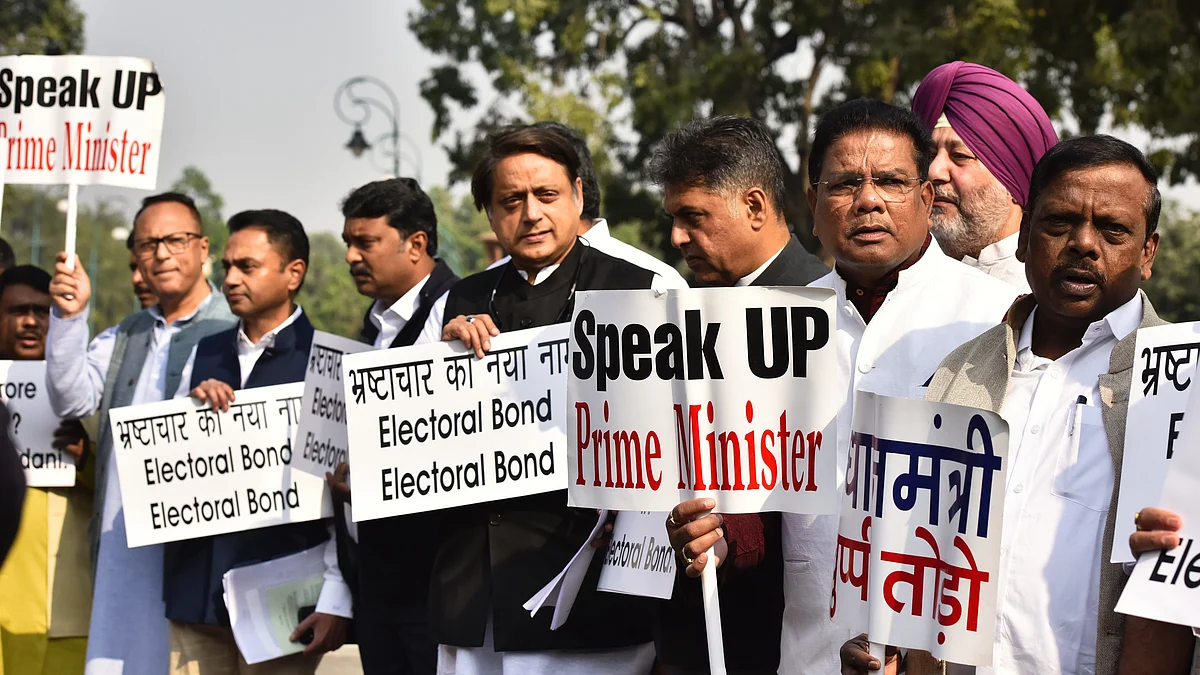POLITICS
Citizens have no right to know source of electoral bond funds: Modi govt to SC
The BJP has received Rs 5,270 crore out of a total of Rs 9,208 crore or 57 per cent of all total electoral bonds sold from 2018-22, Election Commission data revealed

In a bizarre argument submission that may have long-lasting impact on electoral reform, the transparency debate regarding opaque funding to political parties, and eventually on democracy, the Modi government has told the Supreme Court that citizens of the country do not have a right to know the source of funding received by political parties.
In a statement filed before the SC in the electoral bonds case, attorney-general R Venkataramani has submitted that citizens do not have the right to information under article 19(1)(a) of the Constitution regarding the funding of a political party, refuting the petitioners' argument that citizens have the right to know the source of funding for a political party.
"First, there can be no general right to know anything and everything without being subjected to reasonable restrictions. Second, the right to know as necessary for expression can be for specific ends or purposes and not otherwise," the AG said, adding that the judgments upholding the citizens’ right to know of the criminal antecedents of candidates cannot be extrapolated to mean that they have the right to information regarding the funding of parties.
Stating that those judgments were in the context of making informed choices about electoral candidates and knowing their antecedents, the top law officer of the Union said that information limited to such knowledge serves a "specific end of citizens’ choice of electing candidates free from blemish".
"Right to know for specific rightful expression was thus conceived. From that, it cannot be said that the right to know for general or broad ends necessarily follows," he said, also asking the SC to refrain from entering the domain of policymaking.
Published: undefined
All this came just two days before a hearing in front of a five-judge bench headed by Chief Justice DY Chandrachud on 31 October. Earlier this month, a three-judge bench comprising the CJI and justices JB Pardiwala and Manoj Mishra referred the matter to a five-judge bench “in view of the importance of the issue raised”.
"The scheme does not impinge upon any existing right of any person and cannot be said to be repugnant to any right under Part III of the Constitution. In the absence of such repugnance, the scheme will not be illegal. A law which is not so repugnant cannot be voided for any other reason," Venkataramani was quoted as saying by the Times of India.
Arguing that judicial review is not about scanning state policies Venkataramani said the SC's landmark judgment in the People's Union for Civil Liberties case in 2003 directing candidates in the fray to declare their criminal antecedents was to enable voters to make an informed choice.
"The right to know the criminal antecedents of a candidate, which can be of utility and electoral bonds valid?" the AG said. "It (opaque funding) ensures and promotes clean money being contributed. It ensures abiding by tax obligations. Thus, it does not fall foul of any existing right."
Published: undefined
Reacting to the Centre’s submission in the SC, senior Congress leader and former Union home minister P Chidambaram pointed out that the BJP will raise the fund through big corporates. “On the eve of the hearing of the electoral bonds case, the BJP has made its intentions clear. The BJP will raise its funds from big corporates in an opaque, secretive and conspiratorial manner. The answer to this is transparent crowd-funding from small donors through recordable digital transactions. Let's see who wins: the Big corporates or the Small citizen who takes pride in contributing to a political party” he wrote on X.
Saying that “contribution to political parties has democratic significance and is a fit subject for political debate”, the AG stated, “Demand of governance accountability free from influences does not mean that the court will proceed to declare on such matters in the absence of a clear Constitutionally offending law.”
It is worth mentioning here that according to Elections Commission data, the BJP has received more than half of all electoral bonds bought between March 2018 and 2022. The data says the BJP received Rs 5,270 crore out of a total of Rs 9,208 crore, or 57 per cent of all electoral bonds sold until 2022.
Published: undefined
Challenging the electoral bond scheme, which allows a donor to remain anonymous with exemption from income tax, the petitioners — the Communist Party of India (Marxist), and the NGOs Common Cause and Association for Democratic Reforms (ADR) termed the scheme as "an obscure funding system which is unchecked by any authority".
Interestingly, the Election Commission had conceded through an affidavit in 2019 that the anonymous electoral bond scheme was a "retrograde step" as it has a “serious impact on transparency in political funding”.
Published: undefined
Follow us on: Facebook, Twitter, Google News, Instagram
Join our official telegram channel (@nationalherald) and stay updated with the latest headlines
Published: undefined